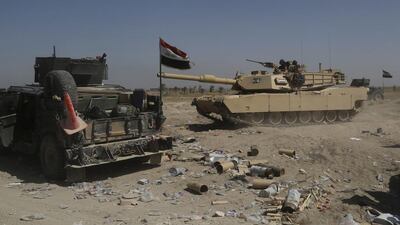BAGHDAD// Iraqi forces face an extended battle to retake from Fallujah ISIL, a minister said, with more than 1,000 casualties so far on the government side.
“Fallujah is a tough nut to crack,” said finance minister Hoshiyar Zebari. “Daesh are holding the population as hostages, not allowing them to escape, and they are putting up a tough fight there.
“Nobody can give you a definitive time when Fallujah will be cleared of Daesh. Mainly because of the resistance, because of the IEDs [improvised explosive devices], because of the tunnels” the militants have dug to move without being detected, he added.
The army started the offensive on May 23, with the backing of the paramilitary Popular Mobilisation Forces (PMF), or Hashed Al Shaabi, which are majority Shiite, and air support from the US-led international coalition against ISIL.
Fallujah, about 50 kilometres west of Baghdad, fell to the extremists in January 2014 before they seized much of Iraq’s north and west, including the second city Mosul.
“The security forces, the PMF have made significant progress but really to storm the center of Fallujah I think will take time,” Mr Zebari said. “We should not declare victory prematurely.”
Prime minister Haider Al Abadi said on Wednesday that the army had slowed the pace of its offensive because of fears for the safety of tens of thousands of civilians trapped in the city with limited access to water, food and health care.
A senior health official in Baghdad said on Friday that more than 1,119 members of the Iraqi forces have been wounded so far in the Fallujah operation.
“The wounded fighters were treated at Kadhimiya, Abu Ghraib, Al Karama, Al Karkh and Yarmuk hospitals,” he said.
The official said the casualty toll included members of the army, police, counter-terrorism service and the Hashed Al Shaabi.
Iraqi military commanders are not divulging casualty figures.
The health official could not provide a figure for the number of fighters killed.
The bodies of the dead are usually taken to a morgue near Baghdad airport or other locations and then collected directly by the families.
The number of funerals held across the country however suggests the Fallujah battle is taking a high toll.
The coffins of at least 70 fighters killed in the Fallujah fighting had by Wednesday been brought to Najaf’s Valley of Peace cemetery, where many from Iraq’s Shiite majority bury their dead, according to a security source there.
Officials in Basra said the southern province had lost 26 fighters from the Hashed Al Shaabi force alone.
Fallujah would be the third major city in Iraq recaptured by the government after former dictator Saddam Hussein’s home town Tikrit and Ramadi, the capital of Iraq’s vast western Anbar province. Mr Al Abadi has expressed hope that 2016 will be the year of “final victory” over ISIL, with the capture of Mosul, their de facto capital in northern Iraq.
Baghdad-based political analysts said the battle for Fallujah would be harder than Tikrit and Ramadi because of the symbolism of the city for the militants and because they cannot retreat to other places, as the whole area is under siege by the army and Shiite militias.
“In Fallujah, Daesh has die-hard fighters defending a city they consider as a symbol for Jihad,” said analyst and former army general Jasim Al Bahadili.
Political analyst Ali Hashim said that even if the government managed to retake Fallujah, it would continue to face the problem of winning over the Sunni population, some of whom feel marginalised by the Shiite-led government.
* Reuters and Agence France-Presse

